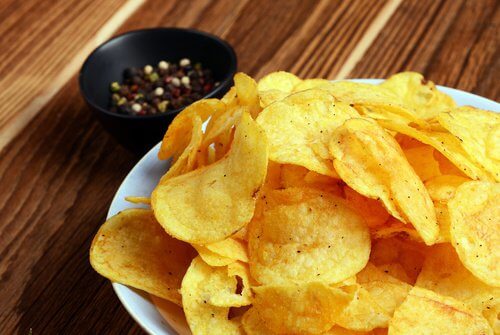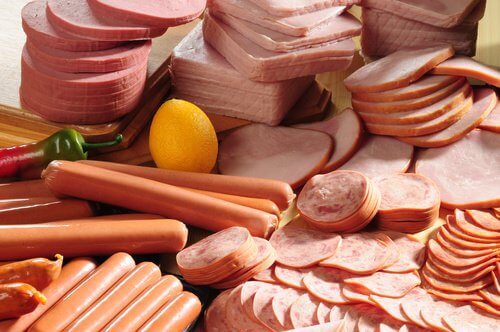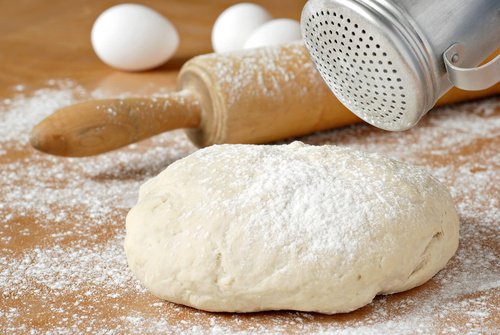9 Foods to Steer Clear of if You Have Colitis

Today’s article will give you a list of foods to avoid if you have colitis. This digestive disease is due to inflammation in the large intestine. This is usually due to food poisoning or a parasitic infection, according to this study conducted by Harvard University.
Many tend to mistake colitis for common cases of diarrhea, one of its main symptoms. However, this condition is way more severe, and almost always manifests as bloating, abdominal pain, and fever.
Also, unlike other digestive problems, it usually happens recurrently over a longer period. Thus, it’s useful to know more about the disease.
You should learn more about the foods can worsen your symptoms. Today we’re going to share nine of the main ones to avoid so continue reading.
1. Fried and fatty foods

Fried foods and those with high levels of fats can worsen the symptoms of colitis. This is because they hinder digestion and increase inflammation. In addition, some data indicate that high-fat diets worsen the disease by altering the intestinal barrier.
You can easily corroborate this with the subjective experiences of some patients. In a study of the dietary practices of a group of people with colitis, 29 percent reported their symptoms worsened after eating fatty foods.
2. Grains and whole seeds
It’s always been recommended to eat fiber to improve digestion. However, colitis patients should skip foods made from grains and whole seeds. Soluble fiber is the best option for those with colitis, as stated in this investigation carried out by the Federation of Crohn’s and Ulcerative Colitis Associations.
3. Coffee and tea

People diagnosed with this disease should avoid drinks with caffeine as much as they can — coffee and tea, among others. At least according to this report by Sociedad Española de Medicina Interna. This is because this substance increases the levels of inflammation in the colon and affects the process in charge of waste elimination.
- Caffeinated beverages can cause cramps and worsen irritation
- Also, it tends to build up in your body and thus, alters the processes pertaining to the elimination of toxins.
4. Dairy products
Whole milk along with most dairy products are the first ingredients that colitis patients eliminate from their diets. Many of them report discomfort and worsening of their symptoms. This is largely due to the presence of lactose. Note that this doesn’t happen in all of those affected by this condition.
For this reason, experts advise steering clear from milk and dairy products, at least during outbreaks or acute phases of the disease. Especially if their consumption leads to gastrointestinal discomfort. In some cases, low-fat yogurts or soft cheeses may be more suitable if you have lactose malabsorption.
Read about the Teas that Help with Digestive Problems
5. Sausages and cold cuts

Sausage and processed meats not only contain high levels of fat but also sodium and artificial additives that promote intestinal irritation. Their regular intake generates digestive difficulties and increases the presence of toxins in the colon.
Data obtained from different studies showed an association between excessive consumption of red meat and processed meat. Also, a higher incidence of inflammatory bowel diseases (colitis and Crohn’s disease). In the case of colitis, the also observed an increase in recurrence.
According to the authors, it could be due to the destruction of the intestinal microbiota. This impairs the integrity of the colon wall and would aggravate dextran sulfate-induced colitis.
6. Margarine, an enemy of people with colitis
Margarine and other products made with hydrogenated fats shouldn’t be part of the diet of those with colitis. In fact, the public at large should avoid it entirely as it’s usually linked to inflammatory processes and cardiovascular disease.
Likewise, observational data revealed that the presence of trans fats in your diet could increase your risk of ulcerative colitis (this isn’t the only triggering factor though).
7. Refined flours

Dietary fiber is present in some plant foods such as vegetables, fruits, and cereals. Foods that have more of it add bulk to the stool and promote intestinal transit.
For this reason, it may be more appropriate to opt for white pasta, bread or rice as well as cooked vegetables and fruits during an episode of colitis. Especially if there’s diarrhea and inflammation.
Once the critical moment is over, gradually re-introduce fiber-rich foods. In general, these are good for you and shouldn’t be missing from a healthy diet.
8. Carbonated and alcoholic drinks
Carbonated and alcoholic drinks are highly irritating for those with colitis and digestive problems. At least that’s what the previously mentioned report from Asociación Española de Medicina Interna indicates.
- Their content of refined sugars, as well as carbon dioxide and colorants, increases acidity and inflammation
- Also, the ingredients in these drinks are responsible for symptoms such as flatulence
9. Non-absorbable sugars are not suitable for colitis patients.
Alcohols such as sorbitol, mannitol and other sugar ones are present in sugarless products like chewing gum and candies, ice cream, sweets, some fruits and fruit juices (pear, peach or prune for example).
These types of carbohydrates rapidly ferment by the intestinal bacteria and can lead to increased gas production. They also attract water to the colon and may trigger an episode of diarrhea.
Some dietary analyses show that the suppression of foods high in FODMAPs (sugars are one of them) results in an improvement of symptoms in 50 percent of people with colitis and other inflammatory bowel disorders.
Steer clear from the above foods if you have colitis
Diet is a key factor in the management of inflammatory bowel diseases like colitis, especially to improve the symptoms that appear during flare-ups. At the moment, most experts point out that there’s no specific diet to deal with this situation though.
During these moments, it’s best to reduce the intake of all the foods mentioned above as much as possible. However, don’t entirely exclude them from your diet.
The best thing to do is draw up an individual list of the best and worst accepted foods. In addition, consult a specialist to look for healthy alternatives that can facilitate the control of the disease and avoid possible nutritional deficiencies.
All cited sources were thoroughly reviewed by our team to ensure their quality, reliability, currency, and validity. The bibliography of this article was considered reliable and of academic or scientific accuracy.
- Aggarwal D, Burns H, et al. Dietary practices in patients with inflammatory bowel disease-food for thought. BMJ Journals. 64 (1).
- Ananthakrishnan A, Khalili H, et al. Long-term intake of dietary fat and risk of ulcerative colitis and Crohn’s disease. Gut. Mayo 2014. 63 (5): 776-784.
- Ballesteros-Vásquez M. N, Valenzuela-Calvillo L. S, et al. Ácidos grasos trans: un análisis del efecto de su consumo en la salud humana, regulación del contenido en alimentos y alternativas para disminuirlos. Nutrición Hospitalaria. Febrero 2012. 27 (1).
- Basson A. R, Chen Ch, et al. Regulation of intestinal inflammation by dietary fats. Frontiers in Immunology. Febrero 2021.
- Bermejo, F., Guerra, I., & López-Sanromán, A. (2012). Colitis ulcerosa. Medicine. https://doi.org/10.1016/S0304-5412(12)70298-6.
- Crohn’s & Colitis Foundation of America. (2014). The Facts About Inflammatory Bowel Diseases. Inflammatory Bowel Diseases. https://doi.org/10.1097/00054725-199606000-00001
- Dan-Ping L, Cui M, et al. High read meat intake exacerbates dextran sulfate-induced colitis by altering gut microbiota in mice. Frontiers in Nutrition. Julio 2021.
- Gearry R. B, Irving P. M, et al. Reduction of dietary poorly absorbed short-chain carbohydrates (FODMAP’s) improves abdominal symptoms in patients with inflammatory bowel disease – a pilot study. Journal of Chron’s and Colitis. Febrero 2009. 3 (1): 8-14.
- Medline Plus. Dieta baja en fibra y residuos. Agosto 2020.
- Ng, S. C., Shi, H. Y., Hamidi, N., Underwood, F. E., Tang, W., Benchimol, E. I., … Kaplan, G. G. (2017). Worldwide incidence and prevalence of inflammatory bowel disease in the 21st century: a systematic review of population-based studies. The Lancet. https://doi.org/10.1016/S0140-6736(17)32448-0.
- Rosenbaum, M. (1983). Ulcerative colitis. Psychosomatics. https://doi.org/10.1016/S0033-3182(83)73183-X.
- Sociedad Española de Medicina Interna. Colitis ulcerosa.
- Taxonera C, Mendoza J. L, et al. Consumo de lácteos y enfermedad inflamatoria intestinal: ¿invertir la tendencia? Anales de Medicina Interna. Mayo 2004. 21 (5).
- Tripathi K, Feuerstein J. New development in ulcerative colitis: latest evidence, management, treatment, and maintenance. Drugs in context. Abril 2019. 8: 212572.
This text is provided for informational purposes only and does not replace consultation with a professional. If in doubt, consult your specialist.








